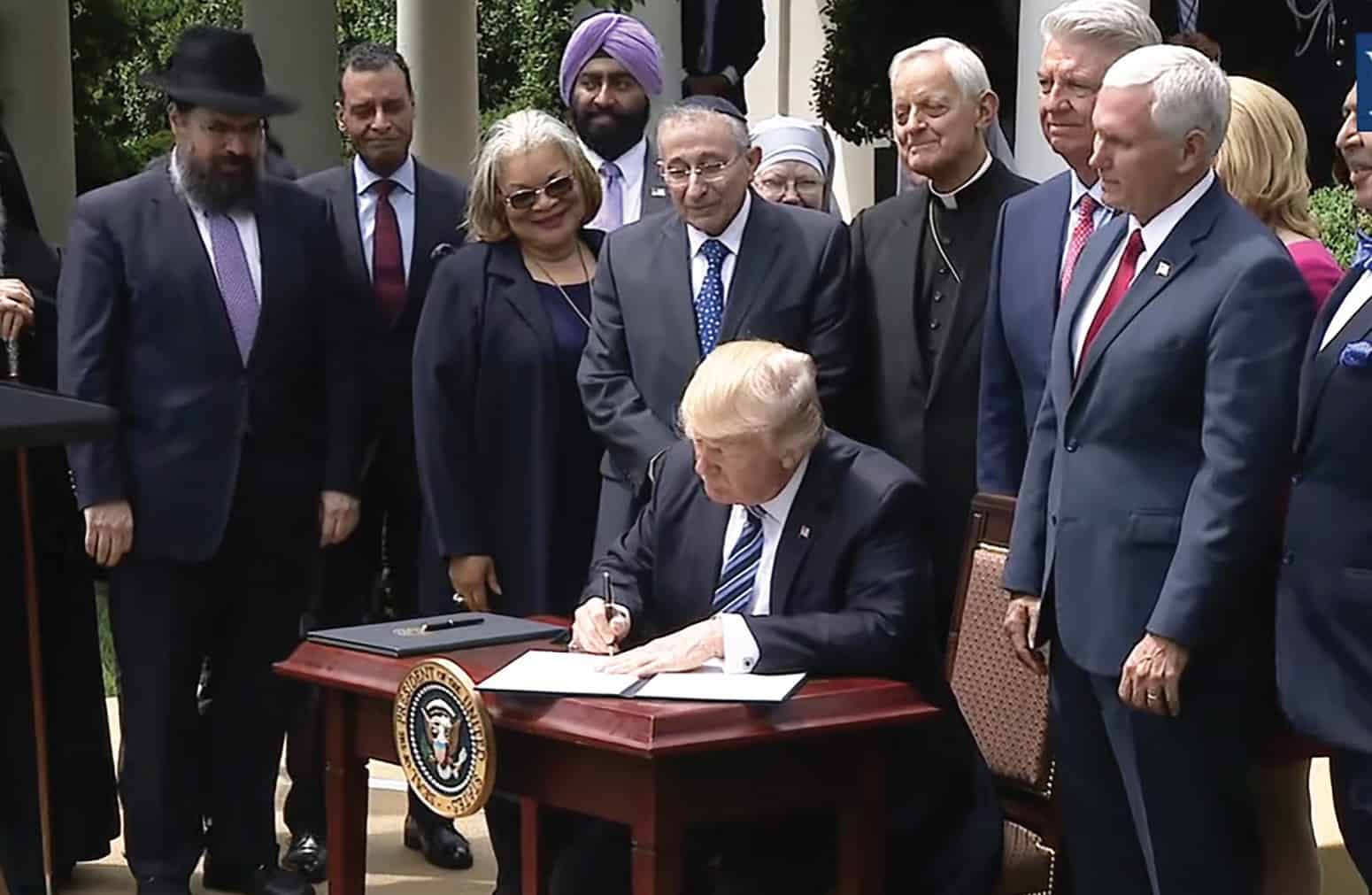If evangelicalism is having an identity crisis, as some religious and cultural observers posit, the issue is whether “evangelical” means a person’s theological beliefs and practice, or is it adherence to a conservative political movement. It has at times meant both, and at points in 2017 we saw the movement struggling with itself over which is “the main thing.”
In this short collection of news stories from last year, we see how evangelicals balanced belief and practice. We witnessed the thumb-wrestling of “Big-E Evangelicalism,” inheritors of the socially conservative political force Moral Majority and keepers of its dwindling flame, and “little-e evangelicalism,” the smaller group who are not merely self-identified evangelicals, but whose core-group of beliefs about Scripture, Jesus, and their relationship to him directly affect their behaviors and drive their moral decision-making.
Donald Trump would not be president without evangelicals, more specifically Big-E Evangelicals, and the presence of some in his administration serves as a reminder of that. There is a group of cabinet leaders and others who meet weekly for Bible study. Spokeswoman (and preacher’s daughter) Sarah Huckabee Sanders is possibly the most visible Evangelical in the White House through her daily televised press briefings. Trump’s appointment of Neil Gorsuch to the U.S. Supreme Court as a hoped-for advocate for religious freedoms was hailed by church leaders. And Southern Baptists were present on several occasions in 2017 when President Trump signed legislation affecting religious liberty.
But the December loss of a U.S. Senate seat by Republican Judge Roy Moore, Alabama’s Ten Commandments champion, to a pro-abortion Democrat has caused some pundits to wonder if the Big-E political/Republican alliance has weakened, and what that might mean for President Trump in the future. Given the special circumstances in that Senate race, moral accusations against Moore, another conclusion is that the biblical beliefs of little-e evangelicals trumped the Big-E political machine in the privacy of the voting booth.
Similarly, a Democrat easily won the governor’s race in Virginia, whose considerable Evangelical population had previously supported a string of GOP governors. Conservative analyst Stephen Mansfield wrote in a new book that the loss can be attributed partly to the disaffection of evangelicals.
“The young, probably in reaction to Trump and to some of the machinations on the Right, went strongly for the Democrat. I think that is an indication of future trends,” Mansfield said in an interview. “It will probably settle down, but I think that the social consciences of the young are raising some important questions.”
But can those assumptions be applied to the President himself, who a year ago got 81% of the white, evangelical vote? “He’s had about a 10-15% drop-off in support from the evangelical community since taking office,” Mansfield summarized. “So while there may be a sort of exaggerated self-reporting around the time when an evangelical casts a vote, there is some indication that there was never really that depth of devotion. I don’t think their support was ever very deep, and it seems to be weakening quickly.”
One conclusion is that little-e evangelicalism—personal, biblical belief and practice—is being separated from its Big-E political counterpart in this generation.
“Many have analyzed the weaknesses of the current iteration of this movement,” writes conservative Presbyterian pastor Tim Keller. “The desire by mid-twentieth-century leaders to foster more widespread cooperation between evangelicals and downplay denominational differences cut believers off from the past, some religion scholars have found…. This has made present-day evangelicals more vulnerable to political movements that appeal to their self-interest, even in contradiction to biblical teachings, for example, about welcoming the immigrant and lifting up the poor. However, evangelicalism is much more resilient than any one form of itself. The newer forms that are emerging are more concerned with theological and historic roots, and are more resistant to modern individualism than older, white Evangelicalism.”
Issues in Illinois
Governor’s race: Evangelicals disappointed by Gov. Rauner’s support for HB 40, which allows state-funding of abortions involving state employees and aid recipients, will be looking for a gubernatorial candidate to support in 2018. Pro-life advocate Jeanne Ives of Wheaton said she would run against Rauner in part because of his signature allowing the abortion legislation. Ives handily won a January straw poll against Rauner among Chicago-area Republican leaders, but she faces an uphill climb against the well-funded incumbent. Seven Democrats are on the March 20 ballot with J.B. Pritzker the apparent leader.
The general election is in November.
Social issues: After successfully moving legalization of same-sex marriage through the Illinois General Assembly, State Senator Heather Steans and some other representatives are preparing to introduce legislation to legalize marijuana use in Illinois. Steans is using economic growth as an argument for legalization, citing a prediction that 250,000 jobs will be created in the “cannabis industry” by 2020. “As many of you may have heard, U.S. Attorney General Jeff Sessions announced last week that he was rescinding an Obama-era policy that discouraged U.S. attorneys from prosecuting operations in states that legalized marijuana,” Steans wrote to supporters. “This change will not diminish our efforts to legalize adult-use cannabis in Illinois.”
A public hearing is scheduled for late January.
Keller wrote in The New Yorker after the Alabama Senate election. Mansfield’s book, “Choosing Donald Trump: Anger, Hope, and why Christian Conservatives Supported Him,” is published by Baker Books.

